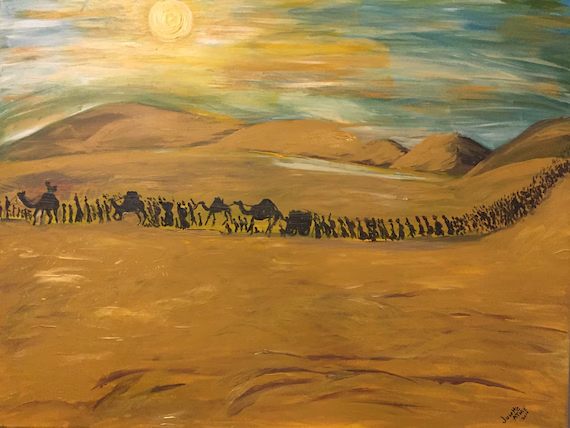The Last Supper
A few days before the Feast of the Passover, which reminded the Jews of when God freed them from being slaves in Egypt, the disciples asked Jesus where they would have this special meal.
'Go to Jerusalem, said Jesus to Peter and John. 'There you'll meet a man carrying a jug of water. Follow him to his house. Ask the owner to show you a room where we'll have the Feast of the Passover together.
Peter and John went to Jerusalem, found the man with the water jug, and followed him to his house. There they made a room upstairs ready, and that evening Jesus and the other ten disciples arrived for the meal.
Before they sat down to eat, Jesus filled a basin with water, picked up a towel and knelt in front of each disciple, one by one, to wash their feet, drying them with the towel.
This work was usually done by a servant, and so when Jesus came to Peter, the disciple protested. 'I can't let you wash my feet, Lord.
Jesus replied. 'If you won't let me wash your feet, then you can't be part of me.
When he had finished, Jesus sat down at the table with his disciples. 'I your Lord, have washed your feet, and you should wash one another's feet.
'I've set you an example to show that the Master is no more important than the servant, and that you should always behave humbly and kindly to each other.
Jesus talked to the disciples for a while, and then he was silent.
The disciples quietly watched him. They could see something was wrong because he looked so sad. Jesus knew he wouldn't be with them much longer, but would die soon.
He broke off a piece of bread from a loaf, dipped it in the sauce in a dish and handed it to Judas Iscariot. 'Do what you have to do, he said.
Judas Iscariot got up quickly from the table and slipped out of the room into the night.
When he had gone. Jesus told his disciples how much he loved them, but he would soon leave them.
He told them that they would not be alone, that God would send his Spirit to help them, and that they were not to be afraid.
Then Jesus picked up a loaf of bread. said a prayer of thanks to God, and broke it up into pieces, passing a piece to each one of the eleven disciples.
'Eat this bread which is my body and remember me, he said. Then he picked up a cup of wine, said a prayer, and passed it to the disciples.
'This is my blood which I give for you and for many people, he said. 'Drink it and remember me.
At last, he said, 'One of you will betray me.
The disciples were stunned. They stared at each other in horror, wondering who it would be.
Then one of the disciples, who was sitting next to Jesus, asked; 'Which one of us is it. Lord?
It is the one I give this bread to, answered Jesus.
When they had finished the supper, Jesus and his disciples sang a hymn and then went out into the dark streets.
They walked to a garden of olive trees, called Gethsemane. On the way. Jesus told his disciples that they would soon run away and leave him alone.
'I would rather die than do that, loudly protested Peter. 'I tell you that you will swear you don't know me three times before the cock crows at dawn tomorrow morning. Jesus said quietly to him.
At Gethsemane, Jesus asked some of his disciples to stay near the gates while he prayed to God.
He walked on to a quiet place in the garden with Peter, James and John, and then went on alone to pray for the courage to face the terrible time that was coming.
When he went back to Peter. James and John. Jesus found they were fast asleep.
'Couldn't you stay awake for just one hour? He asked. 'Please keep watch while I pray, and he walked away.
After he had said his prayers, Jesus again went back to the three disciples and, again, he found they had gone to sleep.
The third time Jesus woke them up, they could hear loud voices and see torches flaring in the dark. It was the Chief Priests with the Temple guards.
Judas Iscariot was leading them to where they could find Jesus and arrest him, far from any watching crowds.
Judas Iscariot walked up to Jesus and kissed him on the cheek. "This is the man you want," he said to the guards.
When the guards stepped forward to take Jesus. Peter drew his sword and tried to defend him. He slashed off the ear of one of the High Priest's servants.
'Put away your sword, Jesus said to Peter and, touching the man's ear, made it whole again.
Then he asked the High Priests. 'Why have you come here with swords and clubs as if I were a criminal? But they said nothing.
The disciples were very frightened. They ran away, just as Jesus said they would, leaving him alone.
The guards grabbed Jesus roughly by the arms and marched him back to Jerusalem.












Comments
Post a Comment